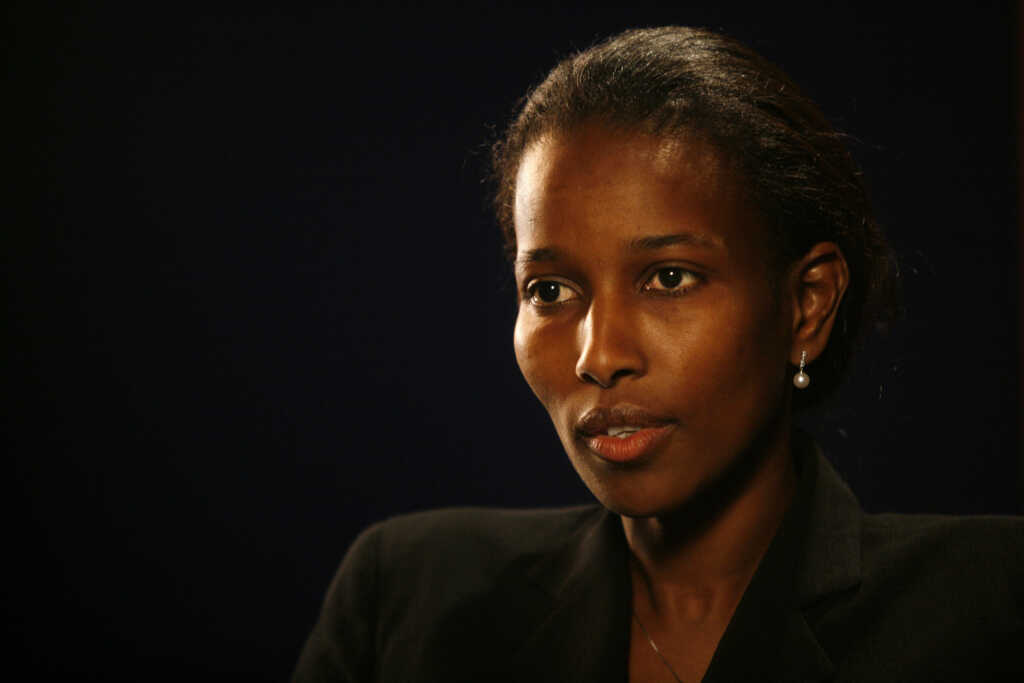An ex-Muslim-turned-atheist became a vocal advocate for women and a fierce critic of her former faith, making international headlines for her commentary and work.
But Ayaan Hirsi Ali’s relationship to the Almighty — and religion — has once again shifted in fantastical fashion, with the activist penning a head-turning op-ed titled, “Why I Am Now a Christian,”
In the piece, she said she’s turned to faith because she found “life without any spiritual solace unendurable.”
Listen to them on the latest episode of “Quick Start” 👇
Ali opened the op-ed by recalling a 1927 lecture by Bertrand Russell titled “Why I am Not a Christian.” She said she discovered this lecture in 2002, just one year after she condemned the 9/11 terror attacks.
At the time, she was a non-practicing Muslim, but with so much chaos unfolding around her and with so many opinions about what was driving radical Islamic terror, Ali found herself slipping into skepticism.
“When I read Russell’s lecture, I found my cognitive dissonance easing,” she wrote. “It was a relief to adopt an attitude of scepticism towards religious doctrine, discard my faith in God, and declare that no such entity existed.”
Ali continued, “Best of all, I could reject the existence of hell and the danger of everlasting punishment.”
She said understanding why she came to embrace atheism requires comprehending the “kind of Muslim” she was, with Ali explaining the Muslim Brotherhood came into her Nairobi, Kenya, community when she was a child.
“[The Muslim Brotherhood] articulated a direction: the straight path. A purpose: to work towards admission into Allah’s paradise after death,” Ali wrote. “A method: the Prophet’s instruction manual of do’s and don’ts — the halal and the haram. As a detailed supplement to the Qur’an, the hadeeth spelled out how to put into practice the difference between right and wrong, good and evil, God and the devil.”
All this led her to believe she must avoid reading novels, seeing movies, dancing, and other novelties. In the end, she was swept up into this ideology, believing she couldn’t befriend unbelievers and, in particular, was taught to develop a “hatred” for Jewish people.
In the end, all of this teaching made Russell’s pedagogy make more sense, with atheism and the lack of such rules and regulations seeming much more tenable. Ali said the more time she spent with people like famed evolutionary biologist Richard Dawkins, the more she felt she made the right decision.
But now, all that has changed, with Ali citing several reasons for her embrace of faith, including recognizing the social benefits of Judeo-Christian values and the emotions she faced in a life devoid of the eternal.
“Western civilisation is under threat from three different but related forces: the resurgence of great-power authoritarianism and expansionism in the forms of the Chinese Communist Party and Vladimir Putin’s Russia; the rise of global Islamism, which threatens to mobilise a vast population against the West; and the viral spread of woke ideology, which is eating into the moral fibre of the next generation,” she wrote.
Ultimately, Ali concluded the “only credible answer” can be found in “our desire to uphold the legacy of the Judeo-Christian tradition” — a tradition she said safeguards human freedom.
Beyond that, though, Ali’s conversion was also rooted in finding a missing heart link.
“I have also turned to Christianity because I ultimately found life without any spiritual solace unendurable — indeed very nearly self-destructive,” she wrote. “Atheism failed to answer a simple question: what is the meaning and purpose of life?”
Ali admitted she has much to learn about Christianity still, but has landed on it was the solution to her personal — and our societal — woes.
Read the entire piece here.
***As the number of voices facing big-tech censorship continues to grow, please sign up for Faithwire’s daily newsletter and download the CBN News app, developed by our parent company, to stay up-to-date with the latest news from a distinctly Christian perspective.***



